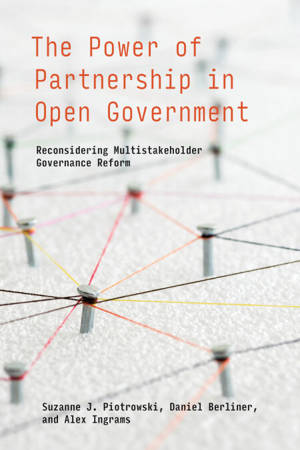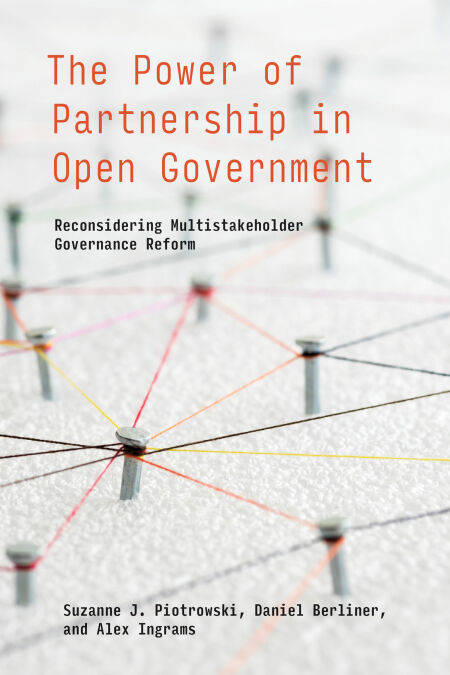
- Afhalen na 1 uur in een winkel met voorraad
- Gratis thuislevering in België vanaf € 30
- Ruim aanbod met 7 miljoen producten
- Afhalen na 1 uur in een winkel met voorraad
- Gratis thuislevering in België vanaf € 30
- Ruim aanbod met 7 miljoen producten
Zoeken
The Power of Partnership in Open Government E-BOOK
Reconsidering Multistakeholder Governance Reform
Suzanne J. Piotrowski, Daniel Berliner, Alex Ingrams
€ 34,49
+ 34 punten
Uitvoering
Omschrijving
What the Open Government Partnership tells us about how international initiatives can and do shape domestic public sector reform.
At the 2011 meeting of the UN General Assembly, the governments of eight nations—Brazil, Indonesia, Mexico, Norway, Philippines, South Africa, the United Kingdom, and the United States—launched the Open Government Partnership, a multilateral initiative aimed at promoting transparency, empowering citizens, fighting corruption, and harnessing new technologies to strengthen governance. At the time, many were concerned that the Open Government Partnership would end up toothless, offering only lip service to vague ideals and misguided cyber-optimism. The Power of Partnership in Open Government offers a close look, and a surprising affirmation, of the Open Government Partnership as an example of a successful transnational multistakeholder initiative that has indeed impacted policy and helped to produce progressive reform.
By 2019 the Open Government Partnership had grown to 78 member countries and 20 subnational governments. Through a variety of methods—document analysis, interviews, process tracing, and quantitative analysis of secondary data—Suzanne J. Piotrowski, Daniel Berliner, and Alex Ingrams chart the Open Government Partnership’s effectiveness and evaluate what this reveals about the potential of international reform initiatives in general. Their work calls upon scholars and policymakers to reconsider the role of international institutions and, in doing so, to differentiate between direct and indirect pathways to transnational impact on domestic policy. The more nuanced and complex processes of the indirect pathway, they suggest, have considerable but often overlooked potential to shape policy norms and models, alter resources and opportunities, and forge new linkages and coalitions—in short, to drive the substantial changes that inspire initiatives like the Open Government Partnership.
At the 2011 meeting of the UN General Assembly, the governments of eight nations—Brazil, Indonesia, Mexico, Norway, Philippines, South Africa, the United Kingdom, and the United States—launched the Open Government Partnership, a multilateral initiative aimed at promoting transparency, empowering citizens, fighting corruption, and harnessing new technologies to strengthen governance. At the time, many were concerned that the Open Government Partnership would end up toothless, offering only lip service to vague ideals and misguided cyber-optimism. The Power of Partnership in Open Government offers a close look, and a surprising affirmation, of the Open Government Partnership as an example of a successful transnational multistakeholder initiative that has indeed impacted policy and helped to produce progressive reform.
By 2019 the Open Government Partnership had grown to 78 member countries and 20 subnational governments. Through a variety of methods—document analysis, interviews, process tracing, and quantitative analysis of secondary data—Suzanne J. Piotrowski, Daniel Berliner, and Alex Ingrams chart the Open Government Partnership’s effectiveness and evaluate what this reveals about the potential of international reform initiatives in general. Their work calls upon scholars and policymakers to reconsider the role of international institutions and, in doing so, to differentiate between direct and indirect pathways to transnational impact on domestic policy. The more nuanced and complex processes of the indirect pathway, they suggest, have considerable but often overlooked potential to shape policy norms and models, alter resources and opportunities, and forge new linkages and coalitions—in short, to drive the substantial changes that inspire initiatives like the Open Government Partnership.
Specificaties
Betrokkenen
- Auteur(s):
- Uitgeverij:
Inhoud
- Aantal bladzijden:
- 304
- Taal:
- Engels
- Reeks:
Eigenschappen
- Productcode (EAN):
- 9780262372084
- Verschijningsdatum:
- 5/12/2022
- Uitvoering:
- E-book
- Beveiligd met:
- Adobe DRM
- Formaat:
- ePub

Alleen bij Standaard Boekhandel
+ 34 punten op je klantenkaart van Standaard Boekhandel
Beoordelingen
We publiceren alleen reviews die voldoen aan de voorwaarden voor reviews. Bekijk onze voorwaarden voor reviews.








